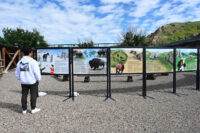Canada can be global ag superpower
By Lethbridge Herald Opinon on September 10, 2020.
Kody Blois
Member of Parliament
On Sept. 23 the Speech from the Throne will lay out the broad policy objectives of the Government of Canada as we recover from the COVID-19 pandemic. Positioning Canada’s agriculture sector as a global superpower should be a key focus.
Agriculture represents $130 billion to our GDP, it employs 2.3 million Canadians, approximately one in eight jobs in this country. In many respects Canada is already an important player on the global stage (Canada is the fifth-largest exporter of agriculture commodities in the world, 11th in agri-food commodities), but our current standing is not guaranteed, and we must position ourselves for future success in a low-carbon economy where global demand for food is expected to rise.
COVID-19 has illustrated areas of opportunity. During the height of the pandemic it became evident the extent to which Canada’s agri-food supply chain has become centralized. At the same time, Canadians have put an increased focus on where their food is coming from, creating a notable uptick in local buying. While government policy and industry decision making on key agri-food processing infrastructure cannot be devoid of basic principles of economies of scale and business efficacy, there is clearly room to evaluate ways to protect food security in regions across the country.
Part of our focus should include shoring up regional capacity domestically, but there is a world of opportunity for Canada to position itself as a key partner in feeding a growing world in a sustainable manner. The Barton Report noted that the agriculture and agri-food industry in Canada has potential to grow substantially by serving a growing global population and an increasing middle class of consumers emerging in developing countries.
How do we position ourselves accordingly?
First is a continued focus on innovation and research. Investments made under the prairie-based Protein Industries Supercluster is a promising start, but further investment in Canada’s Agriculture Research and Development Centres with an emphasis of solving regional or sectoral specific challenges is warranted. Part of the innovation focus must also be on transitioning our agriculture sector to compete in the low-carbon economy of the future. Approximately 10 per cent of Canada’s GHG emissions are tied to agriculture. I do not say this despairingly, simply to say that we need to see investment to help producers transition where possible, while developing policy to reward those who are already and will continue to sequester carbon.
A skilled workforce is key to any industry, and COVID-19 has underlined the inherent challenges the agriculture industry faces. A mixture of incentives to encourage young Canadians to get into the sector, coupled with an immigration strategy to recruit the best and brightest globally who can offer their expertise, would be a significant boost. While labour is key, so, too, is a renewal of Canada’s agri-food infrastructure, with a focus on advanced technologies and automation to ensure we are globally competitive.
Finally, we need to be mindful of finding ways to partner with industry on mitigating risk. While climate change could be a net benefactor for Canada’s growing capabilities, wet springs on the Prairies, hurricanes in the Atlantic, and non-weather-related events such as trade disruptions present challenges. Reinvestment by the federal and provincial governments under the shared Business Risk Management programs to a return of pre-2013 levels are being called for by industry and should be answered.
Reducing risk can also be achieved by regulatory reform such as harmonizing provincial standards and removing inter-provincial trade barriers. For example, it should not be easier for wine producers in Nova Scotia’s Annapolis Valley to get a bottle of our signature Tidal Bay across the Atlantic Ocean than across a provincial border to another Canadian province. It’s 2020, and that needs to change.
Best of all, a focus on positioning Canada as an agriculture superpower has relevance across our country, from St. John’s to Victoria and every place in between. So, let’s use this opportunity to build back a better agriculture sector that is stronger, more innovative, and well positioned to succeed globally and generate greater prosperity at home.
Kody Blois is the Member of Parliament for Kings-Hants, Nova Scotia, serves as a member of the Standing Committee on Agriculture and is Chair of the Liberal Rural Caucus.
15-14




